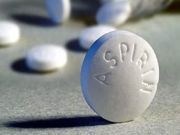News
Article
Aspirin at Bedtime vs. Aspirin in the Morning: Which Produces Greater Cardiovascular Benefits?
Author(s):
Although there appears to be no difference in blood pressure reduction in patients who take aspirin at bedtime compared to those who take it when they awake in the morning, bedtime aspirin may be associated with reduced morning platelet reactivity.

Aspirin is the most commonly used medication for cardiovascular disease prevention, with millions of patients using it every day. Although previous studies have indicated that patients with hypertension who take aspirin at bedtime experience slightly better blood pressure control compared to patients who take aspirin in the morning, similar comparison studies in patients with cardiovascular disease have not been performed.
Because studies have shown that platelet reactivity and cardiovascular disease incidence is highest during morning hours, researchers have proposed that taking aspirin at bedtime may attenuate morning platelet reactivity.
To test this hypothesis, Tobias Bonten, MD, cardiologist with Leiden University Medical Center in Leiden, Netherlands, looked at “the effect of aspirin intake at bedtime compared with intake on awakening” on 24-hour ambulatory blood pressure measurement (ABPM) and morning platelet reactivity in patients using aspirin for CVD prevention.
He reported the study results from “Does Aspirin Intake at Bedtime Decrease Blood Pressure and Morning Peak of Platelet Reactivity?: A Randomized Cross-over Trial” during a poster session at the 2013 American Heart Association Scientific Sessions.
For the study, 290 patients were randomized to take 100 mg aspirin on awakening or at bedtime during two periods of three months. ABPM and morning platelet reactivity were measured at the end of each three-month period.
The study included participants ranging from 18-75 years of age (average age 65 years) who were on medication for hypertension and other cardiac ailments. It excluded patients who had changed their hypertension medicine in the past three months, pregnant women, and shift workers with alternating rhythms.
The primary analysis population comprised 263 (ABPM) and 133 (platelet reactivity) patients.
“Platelet activity is highest in the morning, and that is also the time that most heart attacks and strokes occur, so if you reduce platelet activity during the morning hours, you might reduce heart attacks and stroke at that time,” Bonten said.
He reported that “aspirin intake at bedtime did not reduce blood pressure compared with intake on awakening (difference systolic/diastolic: -0.1 [95%CI: -1.0; 0.9] / -0.6 [95% CI: -1.2; 0.0] mmHg).” Analysis of the data also showed that “platelet reactivity during morning hours was reduced with bedtime aspirin intake (difference: -22 ARU [95% CI -35; -9]).”
Based on these results, Bonten wrote that “intake of aspirin at bedtime compared with intake on awakening does not reduce blood pressure of patients with CVD. However, bedtime aspirin reduced morning platelet reactivity, which might reduce excess cardiovascular events during high risk morning hours.”





